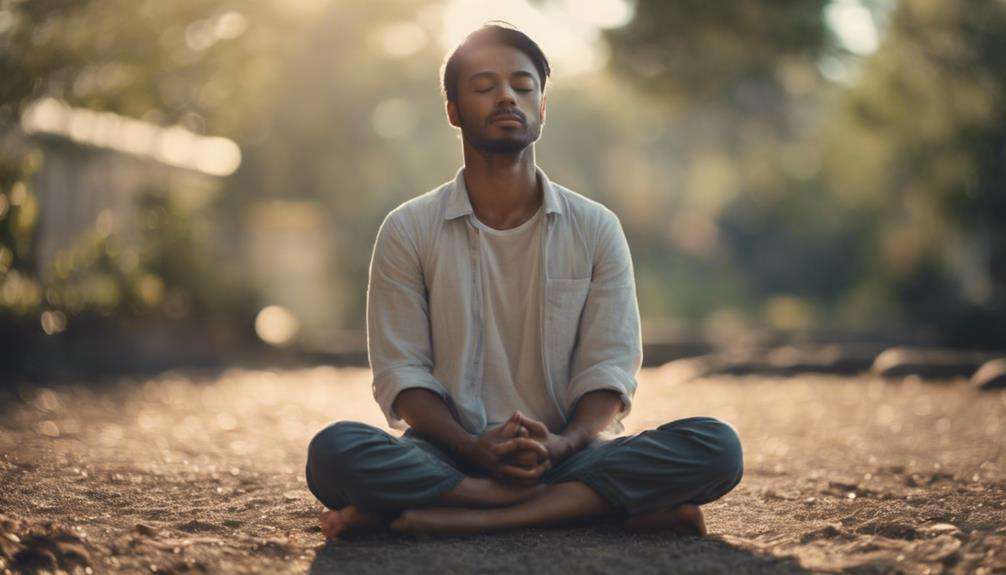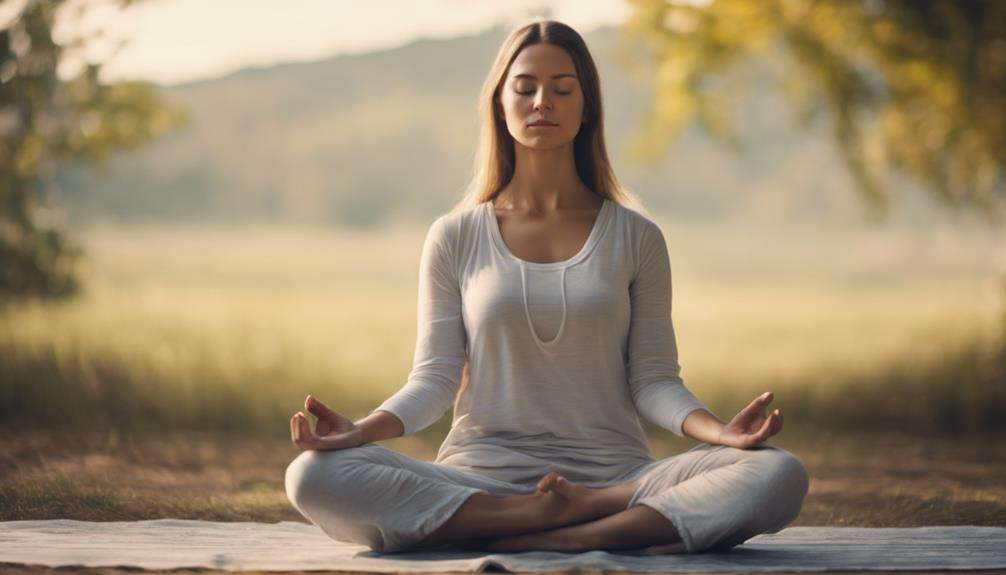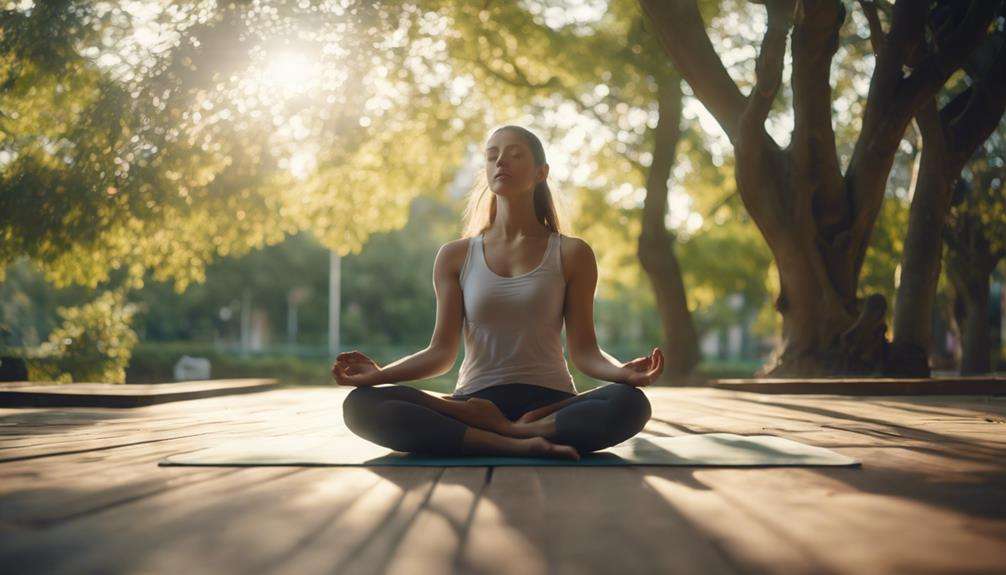When it comes to mental health, the old saying 'a healthy mind is a healthy body' holds true. But how can you truly achieve that harmonious balance? Through the gentle yet powerful practices of yoga and meditation.
These ancient techniques offer more than just physical benefits; they can be the key to unlocking a calmer, more centered mind. Embracing these practices might just be the missing piece in your mental health puzzle.
Key Takeaways
- Yoga and meditation enhance emotional regulation and reduce stress for improved mental health.
- Mindfulness practices increase resilience to stressors, fostering overall well-being.
- Deep relaxation techniques like Yoga Nidra promote calmness and better sleep quality.
- Breathing exercises and mindful practices stabilize emotions, leading to emotional stability and clarity.
Yoga for Increasing Resilience and Coping Skills
Through the regular practice of yoga, you can enhance your resilience and coping skills by reducing stress hormones and promoting the release of natural mood enhancers like endorphins. Yoga's impact extends beyond the physical, delving into mental resilience and coping mechanisms. Research shows that engaging in yoga and meditation can significantly improve cognitive function, emotional regulation, and overall mental well-being. By incorporating these practices into your routine, you equip yourself with tools to navigate the complexities of life with greater ease.
Studies have revealed that yoga and meditation play a pivotal role in lowering levels of anxiety and depression. By mitigating these mental health challenges, individuals experience enhanced emotional stability and a heightened ability to cope with various stressors. The mind-body connection fostered through yoga empowers individuals to manage stress effectively, bolster emotional resilience, and foster a profound sense of inner peace. Embrace yoga as a pathway to fortifying your mental well-being and cultivating adaptive responses to life's challenges.
Mindfulness Practices for Stress Reduction
To effectively reduce stress and anxiety levels, incorporating mindfulness practices like yoga and meditation into your daily routine is highly beneficial. These practices can help improve your mental health by reducing emotional reactivity to stressors and enhancing your overall well-being.
Here are three key benefits of mindfulness practices for stress reduction:
- Enhanced Emotional Regulation: Mindfulness techniques can help you better manage your emotions, allowing you to respond to stressful situations with greater composure.
- Improved Relaxation Techniques: Engaging in mindfulness practices promotes relaxation, helping to calm your mind and reduce feelings of anxiety.
- Increased Resilience: Regular practice of yoga and meditation can boost your resilience to stress, enabling you to navigate challenges more effectively.
Yoga Poses for Mental Clarity

When looking to enhance mental clarity through yoga poses, consider incorporating calming breathing techniques and mindfulness meditation practices. These practices can help you focus your mind, increase concentration, and promote a sense of calmness.
Calming Breathing Techniques
Enhance your mental clarity and relaxation through the practice of calming breathing techniques, a fundamental aspect of yoga poses for promoting mental well-being.
Calming breathing techniques in yoga, such as deep diaphragmatic breathing, help reduce stress hormones like cortisol and activate the parasympathetic nervous system.
Yoga poses like 'Alternate Nostril Breathing' can balance brain hemispheres, enhancing focus and concentration.
Research shows that mindful breathing in yoga improves attention span and cognitive function.
By incorporating these breathing techniques into your yoga practice, you can experience better mental well-being and emotional balance.
- Deep diaphragmatic breathing reduces stress hormones
- 'Alternate Nostril Breathing' balances brain hemispheres
- Mindful breathing enhances focus and concentration
Mindfulness Meditation Practices
As you delve deeper into your yoga practice, exploring mindfulness meditation practices can further enhance your mental clarity and focus.
Mindfulness meditation, integrated with specific yoga poses, aids in reducing stress, promoting relaxation, and improving cognitive function and emotional regulation.
Engaging in these yoga poses for mental clarity can heighten self-awareness, contributing to improved mental health overall.
Regular practice of mindfulness meditation through yoga poses leads to a calmer mind, decreased anxiety, and enhanced cognitive abilities.
By incorporating these practices into your routine, you can cultivate a greater sense of inner peace and mental well-being.
Embrace the power of mindfulness meditation and yoga poses to nurture your mind and body for improved mental clarity and emotional balance.
Meditation Techniques for Emotional Stability
If you're looking to enhance your emotional stability, consider incorporating specific meditation techniques into your routine. Techniques like breathing exercises can bring a sense of calmness, while mindfulness meditation aids in achieving mental clarity.
Visualization practices can help cultivate inner peace, contributing to a more stable emotional state.
Breathing for Calmness
To cultivate emotional stability through meditation, begin by focusing on your breath for calmness and centeredness. Deep breathing techniques activate the parasympathetic nervous system, promoting calmness and reducing emotional reactivity.
Mindful breathing practices stabilize emotions, enhancing emotional regulation for improved emotional stability. Controlled breathing reduces anxiety levels, increasing feelings of calmness and relaxation.
Regular practice of breathing exercises enhances emotional resilience, providing inner peace and tranquility. Breath-focused meditation techniques contribute to better mental health by fostering emotional balance and reducing stress responses.
Embrace the power of your breath to find tranquility amidst life's challenges.
Mindfulness for Clarity
Engage in mindfulness meditation techniques to cultivate emotional stability and clarity for improved mental well-being.
Mindfulness meditation, which involves focusing on the present moment without judgment, is a powerful tool for reducing stress, anxiety, and depression. Studies have shown that regular practice of mindfulness can enhance self-awareness and improve emotional regulation skills.
By incorporating mindfulness into your daily routine, you can experience a reduction in negative emotions and an increase in cognitive function. This practice not only helps in managing overwhelming feelings but also fosters a sense of inner peace and tranquility.
Take a moment each day to center yourself through mindfulness meditation and witness the positive impact it can have on your overall well-being.
Visualization for Peace
Enhance your emotional stability and reduce stress through the practice of visualization for peace, a meditation technique that involves creating mental images of peaceful scenes or positive outcomes. Visualization can help lower cortisol levels, leading to improved emotional well-being.
By regularly engaging in this practice, you can cultivate inner calm and enhance mental clarity. Incorporating visualization into your yoga and meditation practices can foster a peaceful mindset and reduce anxiety.
- Lower cortisol levels
- Improved emotional well-being
- Cultivate inner calm and mental clarity
Breathwork for Anxiety Relief
For anxiety relief, consider incorporating breathwork techniques from yoga and meditation into your daily routine. Deep breathing exercises are powerful tools that can help reduce anxiety by calming the nervous system. By engaging in controlled breathing practices, you can activate the parasympathetic nervous system, which promotes relaxation and lowers stress levels. Studies have indicated that regular practice of breathwork can lead to a decrease in cortisol levels, the stress hormone, resulting in a greater sense of calmness and peace.
Moreover, integrating breathwork into your daily rituals can have a profound impact on your mental clarity, enhancing focus and creating a sense of balance within your mind and body. This practice not only helps manage anxiety symptoms but also boosts emotional resilience, contributing to your overall well-being. By prioritizing breathwork in your routine, you're taking a proactive step towards cultivating a calmer and more centered state of being.
Yoga Nidra for Deep Relaxation

Indulge in the profound relaxation of Yoga Nidra, a guided meditation technique also known as yogic sleep, that facilitates deep mental and physical calmness. Yoga Nidra involves a systematic process of relaxation, starting from the body and progressing to the mind, promoting a state of profound calmness while maintaining awareness.
Research indicates that practicing Yoga Nidra can significantly reduce stress, anxiety, and improve overall mental well-being. Here are some benefits of incorporating Yoga Nidra into your routine:
- Enhances sleep quality and aids in sleep improvement.
- Alleviates symptoms of insomnia and PTSD for better mental well-being.
- Boosts creativity and enhances overall mental clarity.
Frequently Asked Questions
Does Yoga and Meditation Help Mental Health?
Yoga and meditation greatly aid mental health by enhancing mindfulness techniques, reducing stress, promoting emotional balance, and fostering self-care practices. These practices cultivate relaxation, breath awareness, inner peace, mental clarity, cognitive benefits, and healing power.
What Are 5 Ways to Improve Mental Health?
To improve mental health, focus on stress management, mind-body connection, emotional balance, self-care practices, and inner peace. Incorporate relaxation techniques, nurture a positive mindset, enhance cognitive function, and foster mental clarity for overall well-being benefits.
In What Way Can Yoga Help in Improving One Mental Condition?
Yoga can help improve your mental condition by reducing stress, relieving anxiety, enhancing the mind-body connection, balancing emotions, boosting cognitive function, regulating mood, increasing self-awareness, triggering relaxation responses, building resilience, and aiding in trauma healing.
How Can I Be Mentally Strong by Yoga?
To be mentally strong through yoga, focus on the mind-body connection, stress relief, emotional balance, inner peace, self-awareness, mental clarity, resilience building, anxiety reduction, focus enhancement, and positivity promotion. Consistent practice can enhance your mental well-being.
Conclusion
In conclusion, incorporating yoga and meditation practices into your daily routine can significantly improve your mental well-being.
Did you know that a study published in the Journal of Clinical Psychology found that regular yoga practice can reduce symptoms of depression by 50%?
By committing to these practices, you can enhance your resilience, cope with stress more effectively, and cultivate inner peace.
Take the first step towards a healthier mind today.






